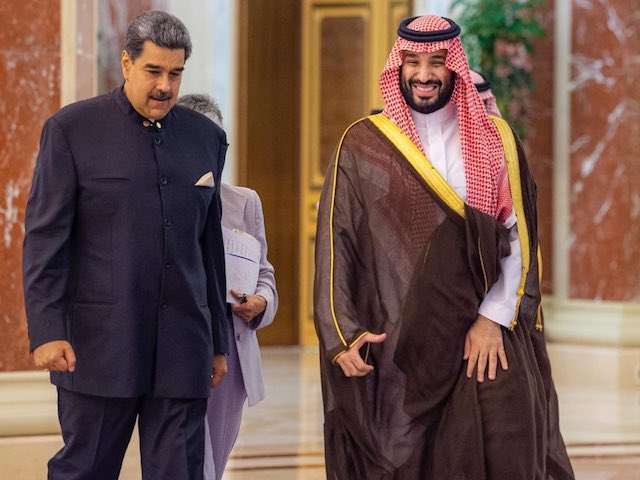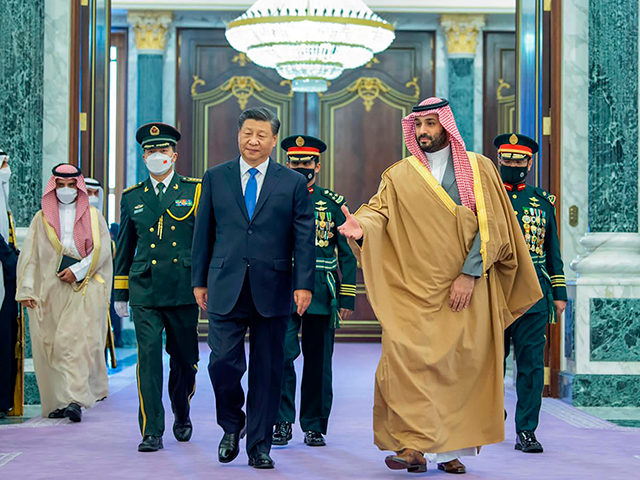Saudi Energy Minister Prince Abdulaziz bin Salman told reporters on Sunday that he “ignore[s]” concerns about growing friendship between Riyadh and Beijing, much of it coming from the United States, because too much “opportunity” exists for growth between the two countries.
The energy minister was discussing China-Saudi ties at the Arab-China Business Conference in Riyadh on Sunday, an event the Saudi government touted as bringing together thousands of political and business elites and resulting in “$10 billion in investment agreements,” most of them involving Saudi projects. The conference follows a visit by genocidal Chinese dictator Xi Jinping to the country in December, which culminated in the signing of deals worth nearly $30 billion, according to the Saudi Press Agency (SPA).
The conference occurred shortly after American Secretary of State Antony Blinken departed the Saudi city of Jeddah after meetings with high-level officials, including Crown Prince Mohammed bin Salman. Prior to his arrival, Reuters described addressing the growing relationship between the Saudi government and communist China as “probably the most important element of Blinken’s visit,” but neither Washington nor Riyadh mentioned China in its statements on the visit.
Met with Crown Prince Mohammed bin Salman to discuss our shared priorities, including countering terrorism through the D-ISIS Coalition, achieving peace in Yemen, and deepening economic and scientific cooperation. pic.twitter.com/nmNJqgBMuG
— Secretary Antony Blinken (@SecBlinken) June 7, 2023
Growing business and political ties between Saudi Arabia and China appear to be developing at the expense of the longstanding Saudi alliance with the United States. Under left-wing President Joe Biden, who vowed as a candidate to turn the country into an international “pariah” while running for president in 2020, America has lost significant influence with the Saudi government, prompting the Saudis to take multiple measures in the past year that damage American interests, including pushing for multiple oil production cuts within the oil cartel OPEC+ and restoring diplomatic ties with state sponsor of terrorism, Iran. Notably, the groundbreaking Iran-Saudi deal was brokered in Beijing.
The Saudi government has disregarded its role as the custodian of the holiest sites in Islam, and thus a leader in the Islamic world, in its negotiations with China. China is currently engaging in a genocide of indigenous Muslim communities in occupied East Turkistan, forcing millions into concentration camps and engaging in forced sterilization, gang rape, and slavery. Riyadh has not only failed to condemn the genocide, but actively supports it as an “anti-terrorism” operation.
Saudi Arabia warmly welcomed one of the world’s most anti-American leaders, Venezuelan socialist dictator Nicolás Maduro, the day before it welcomed Blinken.

Venezuelan dictator Nicolás Maduro meets Saudi Crown Prince Mohammed bin Salman in Jeddah, Saudi Arabia, June 5, 2023. (Ministry of Foreign Affairs – Saudi Arabia)
Prince Abdulaziz told reporters during the conference on Sunday that the Saudi government has no interest in “competing” with communist China.
“Oil demand in China is still growing so of course we have to capture some of that demand,” Reuters quoted the prince as saying. “Instead of competing with China, collaborate with China.”
On Western concerns regarding Saudi Arabia’s growing role in China’s diplomatic orbit – and its granting of increasing geopolitcal influence in the Middle East to the Communist Party – Prince Abdulaziz said he simply disregards them.
“I actually ignore it because … as a business person .. now you will go where opportunity comes your way,” the energy minister said, according to Reuters. “We don’t have to be facing any choice which has to do with (saying) either with us or with the others.”
The regional outlet Arab News reported the energy minister as describing parallels between the future goals of both China and Saudi Arabia, in particular the potential “synergy” between the Saudi Vision 2030 program – a holistic plan to diversify the Saudi economy away from oil and modernize its culture – and the Chinese Belt and Road Initiative (BRI), a global debt-trap plan that claims to intend to build and renovate the world’s transportation infrastructure. China granted Saudi Arabia a role in the BRI – as a predator country offering to build prohibitively expensive projects in poor countries, not as a target nation – during Xi’s trip to the country in December.

In this photo made available by Saudi Press Agency, SPA, Chinese President Xi Jinping, left, is greeted by Saudi Crown Prince and Prime Minister Mohammed bin Salman, after his arrival at Al Yamama Palace, in Riyadh, Saudi Arabia, Thursday, Dec. 8, 2022. (Saudi Press Agency via AP)
“We do not have to be in a place where we set ourselves in competition with China. We have to set ourselves in a place where we collaborate with China,” the outlet quoted him as saying. “There are so many things that we want to do with them (China), but equally, they want to do with us. There is a great deal of synergies between the two countries.”
The Chinese Global Times newspaper, a government publication, described several of the deals brokered at this weekend’s conference as BRI agreeements.
“The agenda includes sessions and discussions that range from investment in the China-proposed Belt and Road Initiative (BRI), clean energy cooperation and the oil and gas supply chain, to tourism and entertainment sectors as well as financing and investment opportunities in the capital markets,” the Global Times relayed. “Under the BRI framework, the two sides have had robust cooperation, which has boosted their development and rejuvenation, according to China’s Ministry of Foreign Affairs.”
Saudi Foreign Minister Prince Faisal bin Farhan bin Abdullah similarly touted long-term cooperation between the Islamist theocracy and the communist Asian state in his opening remarks for the business conference on Sunday.
#Riyadh | On behalf of HRH the Crown Prince, Foreign Minister HH Prince @FaisalbinFarhan inaugurates the 10th Arab-China Business Conference 2023, under the theme “Collaborating for Prosperity”.
📄: https://t.co/qUPekf0SoR pic.twitter.com/6SKD0mdYHG— Foreign Ministry 🇸 (@KSAmofaEN) June 11, 2023
“The conference is an opportunity to strengthen and consolidate the historical Arab-Chinese friendship, build a common future that takes us on a new era that will benefit peoples and maintain peace and development in the world,” the foreign minister said.
The SPA noted in its coverage of his speech that China is both Saudi Arabia’s largest trade partner and that of the other Arab states.
“The minister further stated that the Kingdom of Saudi Arabia makes up 25% of the total volume of trade exchange between China and Arab countries, which reached $106.1 billion in 2022, a 30% increase over 2021,” the SPA added.


